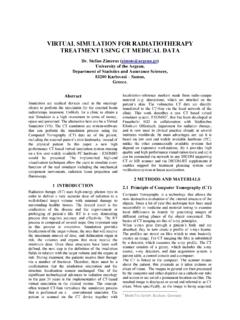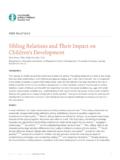Transcription of SOCIALIZATION AND GENDER ROLES W ITHIN THE …
1 SOCIALIZATION AND GENDER ROLES WITHIN THE FAMILY: A STUDY ON ADOLESCENTS AND THEIR PARENTS IN GREAT. BRITAIN. Isabella Crespi Department of Sociology, Catholic University of Milan, Italy ABSTRACT symbolic dimension of the relationship between parents and children. More precisely I intend to address The way we are, behave and think is the final the following questions: product of SOCIALIZATION . Since the moment we are [1] what are the patterns of association between socio- born, we are being moulded into the being society economic conditions and parents' GENDER attitude? wants us to be. Through SOCIALIZATION we also learn [2] what are the direct impacts of parents' GENDER what is appropriate and improper for both genders.
2 Attitude on the young, taking into account the latter's The vast literature on this topic has pointed out a socio-cultural conditions? consolidation of the debate. It allows us to identify Using survey data, I will show different behaviours and strategies, among parents and sons. important problematic bonds relative to the achievement of their GENDER identity throughout their adolescence and to build reciprocity and 1 1 SOCIETY AND GENDER . complementarities between the sexes and the ROLES . valorisation of fundamental contexts such as family. SOCIALIZATION is a relational process between According to psychologists such as Sandra Bem [9], adolescents and parents and its objective is to build one cognitive process that seems nearly inevitable identity [in this case GENDER identity].
3 If the topic of in humans is to divide people into groups. We can GENDER is extremely important for the overview of partition these groups on the basis of race, age, sociological studies, it is even more important if it is religion, and so forth. However, most of the times seen from an intergenerational point of view we split humanity on the basis of GENDER . The speaking about GENDER SOCIALIZATION . first thing we instantly determine, when meeting This paper will focus on how in particular family someone new, is their GENDER . and parents' attitudes mediate traditional GENDER This process of categorizing others in terms of GENDER ROLES and the effect of their attitude towards GENDER is both habitual and automatic.
4 It's nearly ROLES . impossible to suppress the tendency to split the world in half, using GENDER as the great divider. Keywords: GENDER , SOCIALIZATION , youth, generations, When we divide the world into two groups, males and family, stereotypes, GENDER ROLES . females, we tend to consider all males similar, all females similar, and the two categories of males and females very different from each INTRODUCTION other. In real life, the characteristics of women and men tend to overlap. Unfortunately, however, This paper1 is concerned with understanding different GENDER polarization often creates an artificial gap dimensions of GENDER SOCIALIZATION , which vary in their between women and men and GENDER ROLES that impact on the young and which are essential to build are very difficult to change in time.
5 Up a GENDER identity. The aim of the article is to analyse how the GENDER SOCIALIZATION process deals with the structural and GENDER stereotypes for males and females 1I am grateful to the Catholic University of Milan (Italy) for funding the project GENDER SOCIALIZATION within the family: GENDER and Stereotypes are representative of a society's collective generation in comparison out of which this paper is a product. I am knowledge of customs, myths, ideas, religions, also grateful to Prof. Tim Liao (Dept. of Sociology, University of and sciences [30]. It is within this knowledge Essex) for his precious guide into this work. Thanks to Dott. Elena that an individual develops a stereotype or a Bardasi and Dott.
6 Marco Francesconi (ISER-Essex) too, for their support. Neither the original collectors of the data nor the Data belief about a certain group. Social Archive bear any responsibility for the analyses or interpretations psychologists feel that the stereotype is one part presented here. I am the only one responsible for any errors and of an individual's social knowledge. As a result mistakes in the paper. of their knowledge, or lack of knowledge, the truth lies in differential SOCIALIZATION , which stereotype has an effect on their social claims that males and females are taught behaviour. different appropriate behaviours for their Stereotypic behaviour can be linked to the way that the GENDER . stereotype is learned, transmitted, and changed 2 3 GENDER SOCIALISATION.
7 And this is part of the SOCIALIZATION process as well. The culture of an individual influences Socialisation is the process, through which the child stereotypes through information that is received becomes an individual respecting his or her from indirect sources such as parents, peers, environment laws, norms and customs [7] [36]. teachers, political and religious leaders, and the [37]. mass media [27] [30] [47] . GENDER socialisation is a more focused form of In order to understand stereotyping, an individual must socialisation, it is how children of different sexes first be made knowledgeable about the are socialised into their GENDER ROLES [23] [30]. definition of a stereotype2. Stereotyping is how and taught what it means to be male or female we perceive each other, especially individuals [18] [33].
8 Outside our group. What we believe to be GENDER socialisation begins the moment we are born, normal is associated with who we are from the simple question is it a boy or a girl? . hanging out with. Which are usually our friends [24]. We learn our GENDER ROLES by agencies of and social networks [25] [27]. socialisation, which are the teachers of society. GENDER stereotypes are related to cognitive processes The main agencies in Western society are the because we have different expectations for family, peer groups, schools and the media. In female and male behaviour [15] [45] and the respect with GENDER socialisation, each of the traditional GENDER roles3 help to sustain GENDER agencies could reinforce the GENDER stereotypes.
9 Stereotypes, such as that males are supposed to GENDER differences result from the SOCIALIZATION be adventurous, assertive aggressive, process, especially during our childhood and independent and task-oriented, whereas females adolescence [7]. are seen as more sensitive, gentle, dependent, The classical example of GENDER socialisation is the emotional and people-oriented. experiment done with babies that were introduced Here we will deal with the opposite male dominance as males to half of the study subjects and as and feeling superior to women. Of course, not females to the other half. The results are all men have power and arrogantly dominate interesting and quite disturbing at the same time. women; indeed, according to Miller [32], many The participants behave differently according to men are dominated by the system and the sex they had been told [24].
10 [23]. considered disposable. Also, women are given These findings show that other people contribute a lot certain advantages and protected in many to how we see ourselves only on the basis of ways that men do not enjoy. Clearly, each sex GENDER . has and utilizes power in certain ways and we are getting more equal, but, clearly, the sexes aren't equal yet [1, 6]. The most recent 3 The family as gendered suggestion to solve this problem is to relationships: influences on GENDER completely disassociate GENDER from all SOCIALIZATION process personality traits. [28][29]. Within the two career families [3] of today, the It is said before that parents are the primary influence women-are-inferior attitude is muted and on GENDER role development in the early years of concealed, but the archaic sex role expectations one's life [28] [31] [38].








